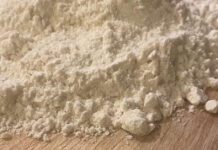There are many reasons that support eating soup for health. This post will explore some of those reasons.
The benefits of soup are many. Soup is quick to prepare. It’s light. It warms you up on a cold winter day. You can freeze it for later. But is soup healthy for you? Yes!
Certain properties of soup make it ideal for treating cold symptoms and other ailments.

Table of Contents
1. Soup is easy to digest
During the cooking process, vegetable fibers and cellulose are broken down from the heat.
Unlike raw or steamed vegetables which require some amount of chewing to break down, vegetables in soup are predigested. This makes soup a good option for gut issues like indigestion, reflux and constipation.
Soups that are high in fat like chowders are harder to digest. Also spicy ingredients should be avoided.
Is soup good for nausea?
When you’re feeling nauseous, sipping on liquids goes down a lot easier than solid food.
The higher salt content in soup also makes it more palatable when dealing with nausea.
Soup provides nutrients when food can’t be tolerated. Adding ingredients like ginger to the broth can help calm an upset stomach. Ginger has anti-inflammatory as well as pain-relieving effects.
2. Soup keeps you hydrated
While soup can contain vegetables, beans and meat, fluid makes up over 90% of its base. For people who struggle to drink water, soup is a nice way to supplement fluid intake.
Fluid helps to hydrate the joints and keeps them flexible. It regulates body temperature and keeps organs functioning properly. Fluid also plays an important role in any weight loss regimen. In addition, fluid helps transport nutrients to cells.
Does soup have electrolytes?
Not only does soup provide fluid, it’s a good source of electrolytes. Electrolytes are made up of minerals including potassium, sodium, magnesium, calcium and chloride. They play an important role in preventing dehydration.
When electrolytes get imbalanced, cramps, spasms and muscle weakness can occur.
Soup broth tends to have a good amount of sodium. In addition, certain vegetables like potatoes, broccoli and spinach are rich in potassium.
You may be surprised to know that soup works faster to hydrate the body than water and sports drinks. And soup has far less sugar which is why eating soup for health makes perfect sense.
Soup has even been recommended by some practitioners to restore electrolytes lost as a result of vomiting, diarrhea, or sweating excessively.
One caveat, too much sodium can increase blood pressure and also lead to fluid retention. Homemade soups give you more control over sodium amounts.
3. Soup is nutrient dense
Chicken broth is a good source of protein, fatty acids and iron. Soups are usually prepared with an assortment of vegetables and proteins like meat and beans. Most people are lucky if they can get 1 vegetable in a meal. With only 10% of adults in America getting enough vegetables in their diet according to one study, every bit counts.
What are the nutritional benefits of soup?
The nutrients in soup really depend on its contents. A soup made with vegetable broth will have more vitamins than a soup made with chicken or beef broth. Bone broth such as chicken or beef broth will contain more protein, collagen and minerals like iron, magnesium, phosphorus and calcium.
Below are common vegetables in soup along with their vitamin and mineral content.
| Vegetable | Vitamins and Minerals |
| Butternut squash | Vitamins A, B-Complex, iron, zinc, copper, calcium, potassium, and phosphorus. |
| Cabbage | Vitamins B1, B5, B6, K, potassium, manganese, iron, and magnesium |
| Collard greens | Vitamins A, B-Complex, C, folate, Vitamin K, iron, calcium, copper, manganese, selenium and zinc |
| Garlic | Vitamin B, C, selenium, manganese |
| Green Beans | Vitamins A, B1, B6, B12, C, folate, iron, iron, calcium, magnesium, manganese, and potassium |
| Onions | B-Complex, Vitamin C, chromium |
| Potatoes | B-Complex, Vitamin C, Potassium, iron, manganese, magnesium, phosphorous, and copper |
| Spinach | Vitamins A, B-Complex, C, K, iron, potassium, manganese, magnesium, copper and zinc |
| Split peas | Vitamin B6, C, iron, magnesium, calcium |
That’s a lot of vitamins and minerals! And since most soup recipes combine a variety of vegetables, you’re sure to cover a wide range of nutrients.
Are you convinced yet that eating soup for health makes sense?
Do vegetables retain nutrients in soup?
Vegetables tend to lose some of their nutritional value when boiled. However, with soup, much of the nutrients from the vegetables will remain in the broth.
To get the most bang for your buck, avoid using wilted vegetables or opt for frozen vegetables. Also use chopped vegetables soon after they’re cut.
You May Also Want to Read
Low FODMAP Diet Provides Proven Results for Multiple Chronic Conditions
Best Probiotics for Gluten Intolerance: A Comprehensive Guide


4. Soup is a good comfort food
The term, “comfort food” can be used to describe foods that provide a sense of security. It includes foods that have a sentimental effect. If your mom made you chicken soup when you didn’t feel well, you may associate the smell and taste of soup with being cared for.
But there’s more behind the comforting effects of a bowl of soup. Have you ever witnessed a baby drifting off into blissful sleep after finishing a warm bottle of milk?
Soup makes your insides feel warm and toasty, especially on a cold winter day. Soup is also filling, especially the dense, hearty varieties. It leaves you feeling satiated and content. That combination of warmth and feeling satiated provides a sense of wellbeing.
Eating comfort foods like soup results in the release of dopamine, the feel good hormone. Comfort foods give your mood a boost on days when you’re feeling down.
5. Soup makes you feel fuller longer
Studies show that people who eat soup before a meal consume less calories during the entire meal. This is because they feel more satiated. This makes soup a good option to include when in a weight loss program.
How full you feel will depend on the soup’s characteristics. For example, the warmer the soup, the more satiated you will feel.
Another factor is the amount of fat contained in the soup. The greater the fat content, the fuller you will feel. Ingredients like butter, red meat, chicken with the skin on are common sources of fat you may find in soup.
The soup’s consistency, whether thick or watery, will also impact how full you feel. Hearty soups like chicken and dumpling soup will make you feel satiated. However beware of ingredients like heavy cream which quickly piles on calories.
How can you make soup into a meal?
A bowl of soup can easily be transformed into a meal by adding rice, pasta, noodles or dumplings. I also like to include healthy servings of protein like chicken.
Can you lose weight eating soup?
A few years ago, the concept of “souping” gained popularity. Souping involves eating a diet of nutrient-dense soups for dieting or cleansing purposes.
People who frequently consume soup have a lower risk of obesity compared to those that don’t. They also have lower BMIs.
In one study, participants who snacked on soup lost 50% more weight than those that snacked on pretzels and chips.
Proponents of souping like this form of dieting because it’s a quick way to lose weight. However much of that weight loss in the first few days is water weight.
In any event, care should be taken to consume enough calories.
6. Soups can help stabilize blood sugar levels
Soups are commonly made with ingredients known for their ability to regulate blood sugar. These include beans, lentils, okra, kale, onions, mushrooms, and Quinoa.
Maintaining healthy blood sugar involves choosing foods that are high in protein and fiber while low in carbohydrates, fat and calories.
Proteins like poultry, fish, and lean meats are often included in soup. Soups are also known for including a variety of vegetables. Vegetables that are low in carbohydrates like green leafy vegetables, rutabaga, celery, and asparagus are excellent choices.
Soups tend to be lower in calories than other meal choices. However, soups made with heavy creams can add unwanted calories.


7. Soup helps relieve cold symptoms
When made with fresh carrots, onions, garlic, parsley and parsnips, the chicken noodle soup has immune boosting qualities. Adding spices like turmeric, black pepper and ginger add flavor and increase the immune boosting effect.
According to studies, chicken noodle soup helps you to get better faster. Chicken noodle soup contains substances that reduce inflammation from upper respiratory infections.
The sodium content in chicken noodle soup helps relieve sore throats, much like gargling with warm salt water.
The heat in soup helps relieve nasal congestion and pain. In addition it helps to increase mucus flow that rids the body of the cold virus.
It’s not uncommon for food to taste bland when you have a cold. Combine that with an iffy stomach and there’s a tendency to avoid eating. But nutrients from food are what’s needed to recover. Moderately applied, salt in soup will add enough flavor to encourage you to eat.
8. Soup made with bone broth helps improve joint health
Bone broth is made by boiling bones and connective tissue long enough to release gelatin, a protein.
The health benefits of gelatin are many including healthy, hydrated skin, thicker hair and improved gut health. Gelatin contains substances that help our bodies build connective tissue in tendons and ligaments. Collagen found in bone broth can help to reduce joint pain resulting from inflammation. But wait, there’s more…
If you suffer from rheumatoid arthritis, an autoimmune disease, bone broth can help reduce cartilage deterioration.
I don’t know about you, but drinking more soup with bone broth is definitely something I’ll be adding to my list of remedies.
Conclusion
Soup is filling, delicious and comforting. It’s also a nutritious source of fluid and electrolytes, a cold reliever and a tummy-soother. It’s versatile enough to play the role of main dish, supporting side or low-calorie snack. Soup supports immune health, and when made with broth, soup supports joint health too. With all these health benefits of soup, your body is undoubtedly asking, “Is it soup yet?”























